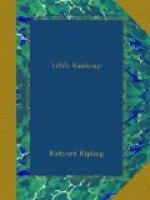But that was not all. They thawed progressively, and in the thawing told me more of their lives and adventures than I am ever likely to write.
Omitting all else, this tale begins with the Lamentable Thirst that was at the beginning of First Causes. Never was such a thirst—Mulvaney told me so. They kicked against their compulsory virtue, but the attempt was only successful in the case of Ortheris. He, whose talents were many, went forth into the highways and stole a dog from a ’civilian’— videlicet, some one, he knew not who, not in the Army. Now that civilian was but newly connected by marriage with the colonel of the regiment, and outcry was made from quarters least anticipated by Ortheris, and, in the end, he was forced, lest a worse thing should happen, to dispose at ridiculously unremunerative rates of as promising a small terrier as ever graced one end of a leading string. The purchase-money was barely sufficient for one small outbreak which led him to the guard-room. He escaped, however, with nothing worse than a severe reprimand, and a few hours of punishment drill. Not for nothing had he acquired the reputation of being ‘the best soldier of his inches’ in the regiment. Mulvaney had taught personal cleanliness and efficiency as the first articles of his companions’ creed. ‘A dhirty man,’ he was used to say, in the speech of his kind, ’goes to Clink for a weakness in the knees, an’ is coort-martialled for a pair av socks missin’; but a clane man, such as is an ornament to his service—a man whose buttons are gold, whose coat is wax upon him, an’ whose ’coutrements are widout a speck— that man may, spakin’ in reason, do fwhat he likes an’ dhrink from day to divil. That’s the pride av bein’ dacint.’
We sat together, upon a day, in the shade of a ravine far from the barracks, where a watercourse used to run in rainy weather. Behind us was the scrub jungle, in which jackals, peacocks, the gray wolves of the North-Western Provinces, and occasionally a tiger estrayed from Central India, were supposed to dwell. In front lay the cantonment, glaring white under a glaring sun; and on either side ran the broad road that led to Delhi.
It was the scrub that suggested to my mind the wisdom of Mulvaney taking a day’s leave and going upon a shooting-tour. The peacock is a holy bird throughout India, and he who slays one is in danger of being mobbed by the nearest villagers; but on the last occasion that Mulvaney had gone forth, he had contrived, without in the least offending local religious susceptibilities, to return with six beautiful peacock skins which he sold to profit. It seemed just possible then—
‘But fwhat manner av use is ut to me goin’ out widout a dhrink? The ground’s powdher-dhry underfoot, an’ ut gets unto the throat fit to kill,’ wailed Mulvaney, looking at me reproachfully. ‘An’ a peacock is not a bird you can catch the tail av onless ye run. Can a man run on wather—an’ jungle-wather too?’




